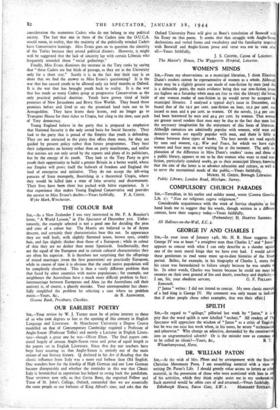OUR EARLIEST POETRY
SIR,—Your review by W. J. Turner must be of prime interest to those of us who took degrees as late as the opening of this century in English Language and Literature. At Manchester University a Degree Course modelled on that of Contemporary Cambridge required a Professor of Anglo-Saxon (Professor Teller) and merely a Lecturer in English Litera- ture—though a great one he was—Oliver Elton. The final papers con- sisted largely of unseen Anglo-Saxon verse and prose of equal length to the papers set in English Literature. Since that day our teachers have been busy assuring us that Anglo-Saxon is entirely out of the main stream of our literary history. Q. declared in his An of Reading that the classic influence from Italy was a more real forbear than Old English. One wonders how far the kinship of High German and our Low German became disreputable and whether the reminder in this war that Classic Italy is besmirched in reputation has helped to swing back the pendulum. Your reviewer now tells us that Gavin Bone, the regretted Fellow and Tutor of St. John's College, Oxford, contended that we are essentially the same people as our forbears of King Alfred's time, and asks that the Oxford University Press will give us Bone's translation of Beowulf with his Essay on that poem. It seems that that struggle with Anglo-Saxon declensions and verbal forms and vocabulary and the familiarity acquired with Beowulf and Anglo-Saxon prose and verse was not in vain after
all.—Yours faithfully, . J. S. COOPER, Canon of Leicester.
The Master's House, The Wyggeston Hospital, Leicester.


























 Previous page
Previous page